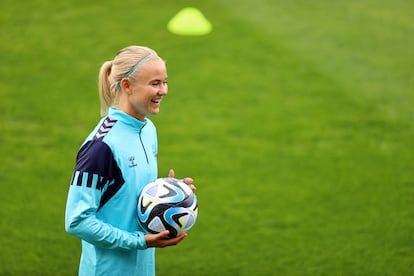

Pernille Harder, the LGTBI voice at the World Cup
The captain and star of Denmark, who is also an activist, is competing in her first world championship at the age of 30.


It happened in the first leg of the Champions League semifinal and it was 10 minutes that Pernille Harder (Ikast, Denmark; 30 years old) felt like glory, even though Barça won by the minimum. After five months on the sidelines due to a hamstring injury, she was back on the pitch. Chelsea celebrated. At the time the team paid the most expensive transfer for the striker -350,000 euros to Wolfsburg- and coach Lars Søndergaard, who recovered his best player to face the World Cup after missing the last three editions in Denmark. It will be the first World Cup for Harder - a goalscorer in Champions League and European Championship finals, with seven league titles in three different countries and the best European player of the decade according to the International Federation of Football History and Statistics (IFFHS) - Danish captain. But Pernille is much more than an armband. She is the voice.
Perhaps scarred in her childhood because she always wanted to play soccer and had no girls’ team to compete with - to the point that she convinced the boys’ U-17 Midtjylland to let her train with them - Pernille wants to be an example for the younger generation. “I had no one to look up to and when I played at home I used to call myself Beckham,” she recalls; “I wanted to be a boy because I didn’t know there were girls’ teams.” Until his sister Louise told him yes, there was the national team. So Harder decided to grow her hair long. “It means a lot to have role models and I hope to be an inspiration to someone,” she agrees now.
That is why in the last World Cup, after her partner Magdalena Erikson played for Sweden in the round of 16 against Canada, they gave each other a planned kiss in the stands. An image that went around the world. “When Pernille and I were kids, there were no gay athletes we could look up to and make us think it’s okay to be gay. We can use our platform as footballers because there are many who listen to us; we can make a difference,” Eriksson resolves. “That photo was very big and made a lot of people write to us to tell us that they looked up to us and how much we had helped them,” recalls Harder, a staunch LGTBI rights activist.
A status he brought up when FIFA banned rainbow armbands - defending the rights of all people regardless of their sexual status - at the last men’s World Cup in Qatar. “You want to follow your values and just say, ‘Fuck FIFA.’ But you also have a responsibility to your team and federation,” the player resolved after learning that for the World Cup in Australia and New Zealand, the international body resolved to bring out eight bracelets supporting different social causes, although the one with the legend One Love in favor of the LGTBI community is missing. “If there were no consequences for anyone but me, maybe I would wear the rainbow bracelet. It’s a bit embarrassing that I can’t show some values that I stand for,” she clarifies.
She always had that vindictive character Harder, who in 2019 led a strike with the rest of the female players for the Danish federation to equalize the prizes with respect to the men’s national team. “We were left out of the World Cup, the consequences were really hard, but it was worth it,” explains Harder. But the Oceania player doesn’t miss it. We flew here in business class. I don’t think we would have done the same thing five years ago,” he says, pleased with FIFA’s increased funding and the deployment of his federation, which has put masseurs, physios and psychologists at the team’s service. Although, he points out, there is still work to be done, as the prizes for the tournament are three times less than those for the men.
Now, however, Denmark wants to enjoy another World Cup. “It’s the first time for everyone, so there’s a bit of stage fright,” concedes attacker Rikke Madsen. “The butterflies in the stomach are part of the sport. And that’s only there if there’s something at stake. So we mustn’t forget that it’s great to take part,” interjects Søndergaard. And they all look at Harder. “Something will affect us at first, but we can help each other find the focus. Little things like meeting in the field and talking.” Pernille’s word, from that captain who, despite being injured for five months, participated in Zoom meetings with the coaches and the other international players to nurture the competitiveness and smooth running of the national team. “This tournament deserves players like Pernille,” said Søndergaard before today’s opener against China in Perth (Australia). Harder will be looking to extend her record for Denmark, already top scorer (70). After the World Cup, she will move to Bayern, leaving Chelsea behind. With her, on the same flight from London to Munich, will go Magdalena, as both have signed until 2026. She will continue to score there. And defending her values. With or without an armband.
Sign up for our weekly newsletter to get more English-language news coverage from EL PAÍS USA Edition
Tu suscripción se está usando en otro dispositivo
¿Quieres añadir otro usuario a tu suscripción?
Si continúas leyendo en este dispositivo, no se podrá leer en el otro.
FlechaTu suscripción se está usando en otro dispositivo y solo puedes acceder a EL PAÍS desde un dispositivo a la vez.
Si quieres compartir tu cuenta, cambia tu suscripción a la modalidad Premium, así podrás añadir otro usuario. Cada uno accederá con su propia cuenta de email, lo que os permitirá personalizar vuestra experiencia en EL PAÍS.
¿Tienes una suscripción de empresa? Accede aquí para contratar más cuentas.
En el caso de no saber quién está usando tu cuenta, te recomendamos cambiar tu contraseña aquí.
Si decides continuar compartiendo tu cuenta, este mensaje se mostrará en tu dispositivo y en el de la otra persona que está usando tu cuenta de forma indefinida, afectando a tu experiencia de lectura. Puedes consultar aquí los términos y condiciones de la suscripción digital.








































